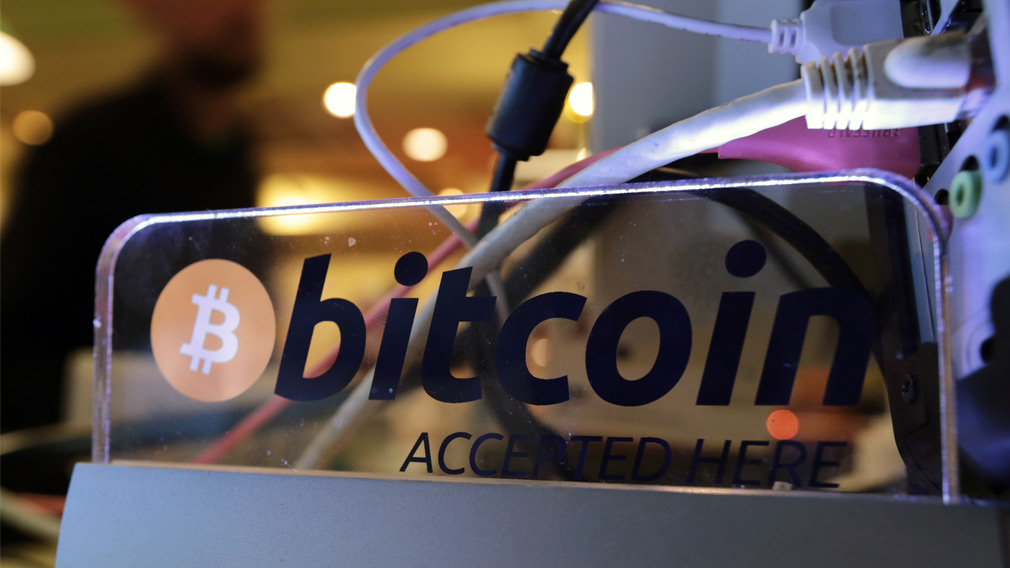Cryptos misunderstood or just too confusing?

A restaurant and bar in Tokyo supporting bitcoin payments. (Getty)
Have you noticed how much quieter the whole cryptocurrency mania has become since prices peaked around six months ago?
That’s not to say they’ve disappeared.
Given that there are now some 1700 cryptocurrencies, that’s not going to happen and indeed the general message from the fans is that their time still just hasn’t quite come yet.
But nothing blows away hype as fast as a dose of financial reality: the major cryptos have lost anything between 63 and 85 per cent of their value this year, depending on the day. Bitcoin, which remains the biggest ahead of the likes of Ethereum, Litecoin and Ripple, is now worth around $US6178, or $US106 billion in aggregate value, against a peak of almost $20,000 in December.
Thus, last month’s elegantly phrased swipe from the head of research at the Bank for International Settlements in Switzerland, Professor Hyun Song Shin, was the last thing the urge to turn the world’s monetary system upside down needed.
Describing cryptocurrencies as “an impractical means of payment” that provides significant scope for fraudsters, he said that two limitations loom large: one, their lack of scalability to function as a payment system and, two, the fact that they lack what he called a guarantee of finality. “This is about a payment being irrevocable and unconditional,” he said.
“Cryptocurrencies fall a long way short of being able to replace the conventional monetary system…finality is essential if we are to ensure that the buyer knows he has the funds to make a payment.”
He would, of course, say this since the BIS is known as the central bankers’ central bank and said bankers appear increasingly uneasy about an innovation that could theoretically put them out of business. And not surprisingly, the salvos from the BIS bunker spurred the crypto brigade into action in short order, poking holes in the research and claiming that the BIS was judging cryptocurrencies too early.
Andrew Main gives his opinion on whether retirees should consider bitcoin as an investment option.
Robert Bishop, a Sydney investment banker who keeps a close eye on the cryptocurrency phenomenon, said some of the negative publicity against cryptos has been excessive and noted how internet companies had grown from tiddlers 15 years ago to now make up 10 per cent of the S&P500 index in the US. He added the fact cryptocurrencies like bitcoin were limited to a finite number creates a scarcity value that “plays into the hands of its supporters”.
“My take on them (cryptos) is that their use for nefarious purposes is actually quite limited,” said Bishop, who has spent decades in the finance industry. “It’s an intellectual error to state that if a few people are doing the wrong thing, then the whole system is flawed.
“Bear in mind that people are doing the wrong thing with conventional currencies and in some listed companies every day, and you’re not hearing calls to abolish them.
“The biggest risks to holders at the moment are hacking, losing the code in your own wallet and the risk of securities regulation, namely treating cryptocurrencies as a regulated security. But that would require a US-led initiative and I can’t see that happening under President Trump.”
So is it time to dump any you might hold in your portfolio? Like all assets it depends when you got in. But the 2017 boom does feel a long time ago. And while young people seem fine with the concepts of digital wallets and mining bitcoins, many “oldies” appear mostly confused.
As for the BIS’s Professor Shin, he was amplifying his own organisation’s annual report which dismissed Bitcoin as “a poor substitute for the solid institutional backing of money” and that cryptos more generally “can simply stop functioning, resulting in a complete loss of value”.
That’s a scary thought for any retirees that have got caught up in the crypto craze, as local media reports have suggested.
A recent position paper from the SMSF Association took a neutral view on the long term possibilities of cryptocurrencies but warned that SMSF trustees in particular have a number of administrative issues to deal with if they want to put any into their SMSF.
It noted the ATO classified Bitcoin as an asset for capital gains tax purposes and that Bitcoin in particular “is neither money nor foreign currency. Therefore, trustees would need to update their documentation to include investment in crypto-assets,” it stated.
“With SMSF legalisation open to the potential of Bitcoin investment, it’s important to remember just because an SMSF can invest in Bitcoin, that doesn’t mean it should.”
A not so subtle hint? Make of that what you will.
The views expressed are those of the author and do not necessarily reflect those of the Westpac Group. This article is general commentary and it is not intended as financial advice and should not be relied upon as such.



